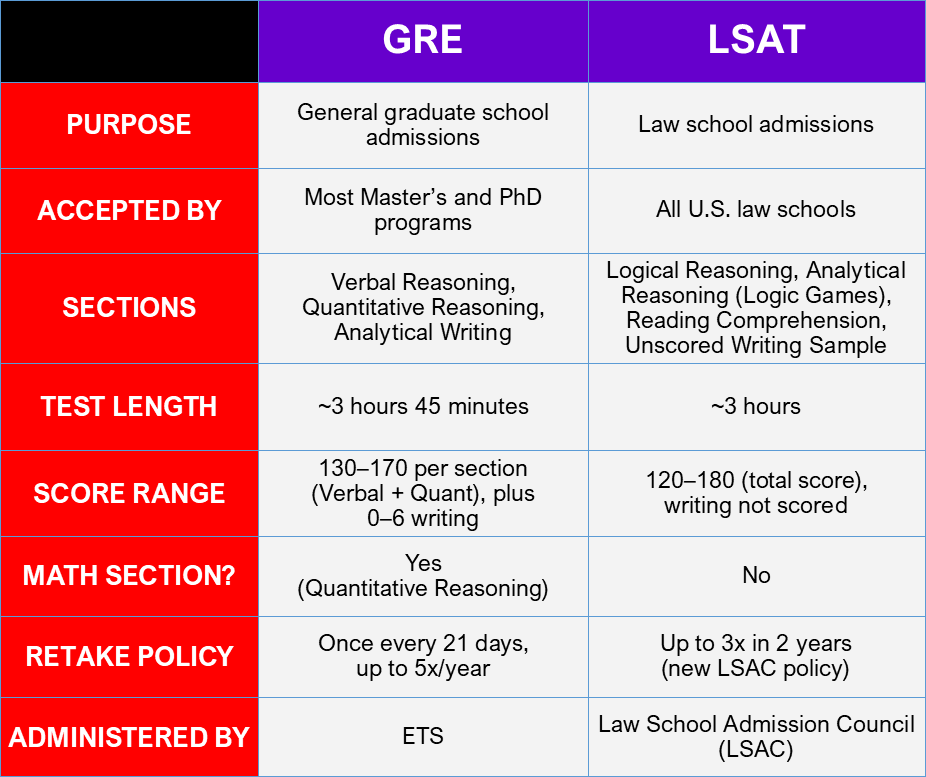
Should You Take the GRE or the LSAT?
By
Stephanie Chen
September 15, 2025
•
2
min read
Share this Article
Simply highlight text to share on social or email
If you’re deciding between the GRE and the LSAT, the first question to ask isn’t which one is easier. It’s which one gets you where you want to go. These two graduate admissions tests are designed for very different academic paths, but there’s a growing overlap between them.
Until recently, aspiring law students had only one option: the LSAT. But now, over half of ABA-accredited law schools accept the GRE as an alternative. That means many students (and especially those considering joint degrees or applying to law school from a non-traditional background) are asking: Can I use my GRE scores instead of the LSAT? And how do the scores compare?
This post walks you through the differences between the exams, where each is accepted, and, YES, the chart you came here for: the GRE to LSAT conversion matrix.
What’s the Difference Between the GRE and the LSAT?

Both tests assess analytical thinking and reading skills, but the GRE also includes a quantitative section, while the LSAT focuses heavily on logic and argumentation.
Where Is the GRE Accepted for Law School?
As of 2025, more than 70 ABA-accredited law schools accept the GRE in place of the LSAT. These include:
- Harvard Law School
- Columbia Law School
- Northwestern Pritzker School of Law
- Georgetown University Law Center
- University of Southern California (Gould)
- University of Michigan Law School
- Yale Law School (pilot program)
Note: Some schools only accept the GRE for specific dual-degree programs (e.g., JD/PhD, JD/MBA), so always double-check with individual admissions offices.
Real Talk: Does Taking the GRE Hurt My Chances at Law School?
This is a common concern…and a valid one. While more law schools now accept the GRE, some students worry they’ll be seen as “less serious” applicants.
The good news: schools that accept the GRE have formally adopted score evaluation policies to ensure parity with LSAT-takers. According to ETS, law schools use GRE scores alongside other metrics and view them holistically, just like they do for LSAT scores.
That said, some schools may still give slight preference to LSAT scores, especially if they are ranked highly and concerned with median scores for U.S. News reporting. If your GRE scores are strong and you have other compelling credentials (GPA, experiences, essays), using the GRE should not disadvantage you.
GRE to LSAT Conversion Chart
Let’s get to the chart itself.
The following GRE to LSAT conversion matrix provides an approximate mapping based on a statistical correlation model between GRE Verbal + Quant scores and equivalent LSAT scores. This is not an official scale used by law schools, but it’s helpful for comparing performance across the two exams.
- Example: A GRE Verbal score of 165 and a Quant score of 160 corresponds roughly to an LSAT score of 167.
- Tip: LSAT scores cap at 180. You’re unlikely to “convert” to a perfect LSAT unless both GRE section scores are 168+.
This matrix is based on the correlation data originally published in:
- ETS Law School Validity Study (2018): PDF
- Supplemented by internal score comparison models and third-party validation sources
What If I’m Still Not Sure Which Test to Take?
If you’re eligible to submit either test, here’s how to decide:
Take the LSAT if:
- You’re 100% committed to law school
- You’re confident in logic puzzles and argument-based reasoning
- You’re applying to T14 schools that still heavily weight LSAT scores
Take the GRE if:
- You’re applying to both law and other grad programs
- You have strong math skills (helps boost your Quant score)
- You’re interested in joint-degree programs (JD/PhD, JD/MPP, JD/MBA)
- You’ve already taken the GRE for another program
Still not sure? Try a free diagnostic for each test. ETS offers free GRE practice exams, and LSAC offers free Official LSAT Prep via Khan Academy and LawHub.
How Important Is the Writing Section?
Neither test places a huge emphasis on writing scores.
- GRE Analytical Writing is scored from 0–6, but most grad programs care more about Verbal/Quant.
- LSAT Writing is unscored but sent to every law school you apply to. Schools may read it for tone, reasoning, and clarity — especially if there are discrepancies between your application essays and writing sample.
Bottom line: Do your best, but don’t stress too much about these sections.
Test Prep Resources
GRE:
- ETS GRE Website
- PowerPrep Online Practice Tests (Free)
- Magoosh, Manhattan Prep, Kaplan, Princeton Review (paid options)
LSAT:
- LSAC LawHub Official Prep
- Khan Academy Official LSAT Prep
- 7Sage, LSAT Demon, PowerScore (paid options)
Final Takeaways
- If you’re applying to law school only, the LSAT is still the safest bet — it’s accepted by every law school, and schools are used to interpreting those scores.
- f you’re a multi-path applicant, especially coming from STEM, international, or interdisciplinary backgrounds, the GRE gives you flexibility and may help you stand out.
Either way, what matters most is how well you perform. Focus on the test that best aligns with your strengths and gives you the best chance of success.
Reach out to AtomicMind for expert support in preparing for the GRE or LSAT. Our test prep specialists are ready to guide you every step of the way.

About the Author: Stephanie Chen is the Director of Marketing at AtomicMind, where she leads brand strategy and outreach. She earned her B.A. from Brown University and her M.B.A. from Columbia Business School, and is passionate about expanding access to quality education through thoughtful storytelling and strategic growth.

Share this Article



